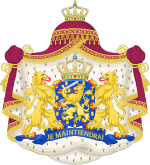Dutch royal house
In the Kingdom of the Netherlands, the monarchy of the Netherlands is a constitutional office and is controlled by the Constitution of the Netherlands. A distinction is made between members of the royal family and members of the royal house. [1]
The royal house and family is the Orange-Nassau family. [2]
Membership
[edit]According to the Membership to the Royal House Act which was revised in 2002, the members of the royal house are:[3]
- the monarch (king or queen) as head of the royal house;
- the members of the royal family in the line of succession to the Dutch throne but limited to two degrees of kinship from the current monarch (first degree are parents and second degree are siblings);
- the heir to the throne;
- the former monarch (on abdication);
- the members of the royal house of further degrees of kinship if they were already members of the royal house prior to the revision of the act in 2002, were adults at the time and remain in the direct line of succession;
- the spouses of the above;
- the widows and widowers of the above, provided that they do not remarry, and that their spouses would still qualify if they were still alive today.[3]: 2.2
Current members
[edit]| Dutch royal family |
 |
|
| * Member of the Dutch royal house |
- The King (King Willem-Alexander of the Netherlands), the current head of the royal house, oldest child of Queen Beatrix
- The Queen (Queen Máxima), wife of the King
- The Princess of Orange (Catharina-Amalia), eldest child of the King and Queen
- Princess Alexia, middle child of the King and Queen
- Princess Ariane, youngest child of the King and Queen
- Princess Beatrix, formerly Queen Beatrix
- Prince Constantijn, third and youngest child of Queen Beatrix and Prince Claus
- Princess Laurentien, wife of Prince Constantijn
- Princess Margriet, sister of Queen Beatrix; an exception was made for her when the act was revised
- Pieter van Vollenhoven, husband of Princess Margriet
Loss of membership
[edit]The membership is lost if the right to succeed to the Dutch throne is lost, e.g. by marrying without parliament’s approval. This applied to several members of the royal family:
- in 1964 Princess Irene married Carlos Hugo, Duke of Parma
- in 1975 Princess Christina married Jorge Guillermo
- in 2004 Prince Friso married Mabel Wisse Smit; the government declined to ask official parliamentary permission for the marriage
- in 2005 Prince Pieter-Christiaan married Anita van Eijk
- in 2005 Prince Floris married Aimée Söhngen
In addition the membership is lost when a person, who was formerly a member, loses his direct right to succession because he or she is no longer related to the current monarch within three degrees of kinship. When King Willem-Alexander assumed the throne in 2013 this applied to:
- Prince Maurits and his wife Princess Marilène
- Prince Bernhard and his wife Princess Annette
Membership is also lost to persons who are still in the direct line of succession, but are no longer related to the current monarch within two degrees of kinship. When King Willem-Alexander assumed the throne in 2013 this applied to:
- Countess Eloise of Orange-Nassau van Amsberg
- Count Claus-Casimir of Orange-Nassau van Amsberg
- Countess Leonore of Orange-Nassau van Amsberg
All children of Prince Constantijn and Princess Laurentien
References
[edit]- ^ "The Official Website of the Dutch Royal House in English". Retrieved 26 April 2011.
- ^ "The Official Website of the Dutch Royal House in English". 14 January 2016. Retrieved 9 January 2024.
The Royal House of the Netherlands is the House of Orange-Nassau.
- ^ a b "Overheid.nl (eng. Dutch government websites)". Retrieved 18 August 2013.
